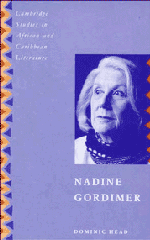Book contents
- Frontmatter
- Contents
- Preface
- List of abbreviations
- Chronology
- 1 Gordimer and South Africa: themes, issues and literary identity
- 2 The early novels: The Lying Days, A World of Strangers and Occasion for Loving
- 3 Developing narrative muscle: The Late Bourgeois World, A Guest of Honour and The Conservationist
- 4 The construction of identity: Burger's Daughter and July's People
- 5 Self-reflexive reassessments: A Sport of Nature and My Son's Story
- 6 The short stories
- 7 Conclusion. Gordimer: postmodernist?
- Notes
- Select bibliography
- Index
2 - The early novels: The Lying Days, A World of Strangers and Occasion for Loving
Published online by Cambridge University Press: 05 July 2011
- Frontmatter
- Contents
- Preface
- List of abbreviations
- Chronology
- 1 Gordimer and South Africa: themes, issues and literary identity
- 2 The early novels: The Lying Days, A World of Strangers and Occasion for Loving
- 3 Developing narrative muscle: The Late Bourgeois World, A Guest of Honour and The Conservationist
- 4 The construction of identity: Burger's Daughter and July's People
- 5 Self-reflexive reassessments: A Sport of Nature and My Son's Story
- 6 The short stories
- 7 Conclusion. Gordimer: postmodernist?
- Notes
- Select bibliography
- Index
Summary
Gordimer's first three novels, The Lying Days (1953), A World of Strangers (1958) and Occasion for Loving (1963) form a distinctive group: in their forms they appear more traditional than the later novels, and this initial greater reliance on novelistic convention seems to marry with the liberal vision of political opposition in the 1950s, which Gordimer shared, prior to the Sharpevilie massacre in 1960 (which occurred during the writing of Occasion for Loving). Yet this view of the early novels, though helpful in broad terms, can be taken to suggest a polarization between Gordimer's early and later novels, and this is inaccurate: there are discernible phases in Gordimer's career, but there are no clear breaks, and these early novels incorporate important preliminary challenges to, and innovations in, novelistic form; elements which are taken up more radically in later work. The early novels also treat thematically issues which become central to the formal and structural ordering of the later novels, and even here such themes have an impact, at times, on form and structure. In various respects, then, these three novels have an importance that cannot be overlooked.
THE LYING DAYS
The Lying Days concerns the partial growth and acquisition of race consciousness of its first-person narrator, Helen Shaw, through adolescence and young adulthood. The book has an autobiographical element, especially in its descriptions of landscape and town – many of these details are drawn from Gordimer's memories of her youth.
- Type
- Chapter
- Information
- Nadine Gordimer , pp. 34 - 76Publisher: Cambridge University PressPrint publication year: 1994



